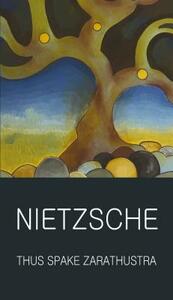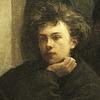Take a photo of a barcode or cover
challenging
reflective
slow-paced
inspiring
reflective
tense
medium-paced
If you want to understand Nietzsche, do not start here. Start with The Gay Science or Beyond Good and Evil, which are his philosophy summed up and understood more easily. All of TSZ is allegorical, and most of it is impenetrable to me. I like a few sections a lot but its definitely not the one book by Nietzsche I would want to read again and again.
My only regret about this work is that I waited this long in my life to finally read it. This is the heart of Nietzsche's philosophy in prose, aping the style and feel of a religious work (with all due irony) - TSZ is moving and insightful.
Von Frauen- und Fremdenfeindlichem Gaga-Geschwurbel bis hin zu lebensveränderndem Zitat war alles dabei, daher fällt es mir schwer, eine Wertung zu vergeben.
it’s a book about a guy who walks around saying riddles to people and sometimes he’s even right
(2.5 Stars)
This was a re-read for me.
The first time I read this, I was in my 20's and it was the 90's. This time I'm in my 50's, and this is a post-truth, post-Trump world. And I have very different takes on it.
After reading this the first time I absolutely loved it. I thought it was telling people to strive for greatness, to rise above any limits, and to be a creator, innovator, composer, philosopher, etc.
Now I feel like it is speaking to people who feel like their own accomplishments are diminished when other people accomplish the same. It feels anti-equity or maybe just pro-exceptionalism.
I did like it, but I didn't find it as enlightening as I did originally. It does cause you to think about what is being said, so it wasn't a loss.
This was a re-read for me.
The first time I read this, I was in my 20's and it was the 90's. This time I'm in my 50's, and this is a post-truth, post-Trump world. And I have very different takes on it.
After reading this the first time I absolutely loved it. I thought it was telling people to strive for greatness, to rise above any limits, and to be a creator, innovator, composer, philosopher, etc.
Now I feel like it is speaking to people who feel like their own accomplishments are diminished when other people accomplish the same. It feels anti-equity or maybe just pro-exceptionalism.
I did like it, but I didn't find it as enlightening as I did originally. It does cause you to think about what is being said, so it wasn't a loss.
«God is dead. God remains dead. And we have killed him.»
“I teach you the overman. Man is something that shall be overcome.”
Over 300 pages of a grown man whining loud. Thus Spoke Zarathustra stands as a pivotal philosophical work, delving into themes of morality, human nature, and the concept of the Übermensch (Overman).
Nietzsche, a 19th-century German philosopher, spent his life challenging traditional values, critiquing Christianity, and advocating for a reevaluation of moral principles.
This book, structured as a series of speeches delivered by the character Zarathustra, portrays the journey of a prophet who announces the death of God and seeks to enlighten humanity about the masculinist Übermensch, a superior individual liberated from conventional morality. Admittedly, Nietzsche employs some cool poetic and metaphorical language, illustrating Zarathustra's philosophical musings on the human condition, the eternal recurrence, and the need for individual self-overcoming.
Nietzsche's life was marked by struggles with health issues and a break from conventional philosophical traditions. His influence on "Thus Spoke Zarathustra" was drawn from his huge disillusionment with Christian morality, his critique of societal norms, and his quest for a revaluation of values in the wake of the decline of traditional religious beliefs.
I have concerns about his perceived glorification of power and individualism, his associations with aristocratic values and his skepticism toward egalitarianism. I find it undermining to human beings. His philosophy focuses too much on extraordinary individuals rather than dealing with bigger societal problems or movements, which there were plenty of, especially in his day. Therefore I find works by Nietzsche, in general, quite dry.
“I teach you the overman. Man is something that shall be overcome.”
Over 300 pages of a grown man whining loud. Thus Spoke Zarathustra stands as a pivotal philosophical work, delving into themes of morality, human nature, and the concept of the Übermensch (Overman).
Nietzsche, a 19th-century German philosopher, spent his life challenging traditional values, critiquing Christianity, and advocating for a reevaluation of moral principles.
This book, structured as a series of speeches delivered by the character Zarathustra, portrays the journey of a prophet who announces the death of God and seeks to enlighten humanity about the masculinist Übermensch, a superior individual liberated from conventional morality. Admittedly, Nietzsche employs some cool poetic and metaphorical language, illustrating Zarathustra's philosophical musings on the human condition, the eternal recurrence, and the need for individual self-overcoming.
Nietzsche's life was marked by struggles with health issues and a break from conventional philosophical traditions. His influence on "Thus Spoke Zarathustra" was drawn from his huge disillusionment with Christian morality, his critique of societal norms, and his quest for a revaluation of values in the wake of the decline of traditional religious beliefs.
I have concerns about his perceived glorification of power and individualism, his associations with aristocratic values and his skepticism toward egalitarianism. I find it undermining to human beings. His philosophy focuses too much on extraordinary individuals rather than dealing with bigger societal problems or movements, which there were plenty of, especially in his day. Therefore I find works by Nietzsche, in general, quite dry.
adventurous
emotional
inspiring
reflective
slow-paced





